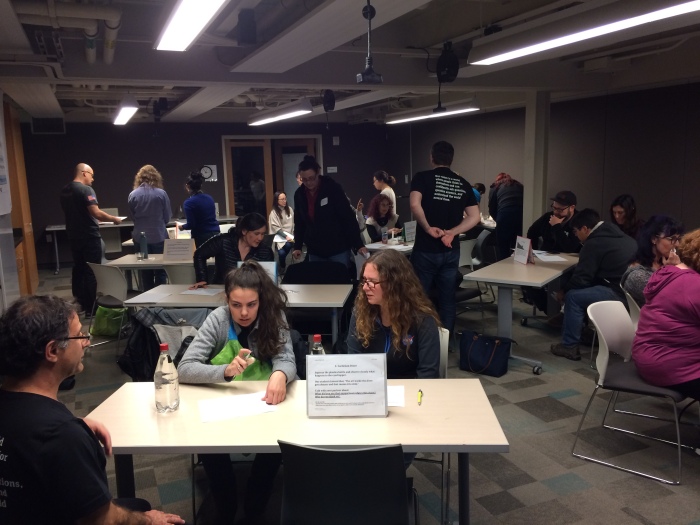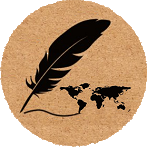So it turns out that the best way to describe my role here at the Exploratorium is something along the lines of ‘apprentice loose cannon’ (NB: I can never usurp Ron’s position of being the ‘official’ Exploratorium loose cannon!). Among the many different things I’ve been involved in, which I’ll no doubt summarise this when my time’s up here, Saturday allowed me to return to being a classic classroom teacher again. Sort of…
The Teacher Institute at the Exploratorium, is, in my opinion, the kind of facility that all educational outreach establishments should have. Consisting of PhD scientists and experienced science educators, they use the wealth of resources offered at the Exploratorium to provide professional development for teachers in a way that allows them to ‘develop their skills as facilitators of inquiry-rich, authentic student learning experiences’.
I’ve dipped in-and-out of the work that they do turning my time here, saw how enthusiastically they go about their work, and had really lovely chats with members of the team. So I was pretty desperate to get involved with something more substantial. To my delight, I was offered the chance to both help out and participate in a professional development conference that they organised. 
In response to an aging set of science standards for US schools and a rapidly competitive world in STEM, a ‘consortium’ of a number of US states, teaching associations and science associations banded together to develop what’s called the ‘Next Generation Science Standards’ or NGSS for short. It’s an courageous idea, but one that is gaining a lot of traction. It is an alternative to adopting the financially-supported Common Core set by the federal (national) government level but 40 states have shown interest, with 19 of them adopting them including California. California, in fact, is one of the states leading the way.
So that brings me back to the Exploratorium and its Teacher Institute. Saturday saw their 5th annual NGSS STEM conference for science teachers of all levels (K-12, which in the UK is the equivalent of all the way from Reception to Sixth Form/College). While my part in all of that was to be a bit of a diluted ‘loose cannon’ (helping sign people in, directing attendees to the correct workshops and locations, taking pictures, contributing to the Twitter #CAngss feed, aiding workshop leaders), I got to participate as a teacher attending a professional development conference.
Thoughts from the field…
The conference started with three practicing research scientists talking about their research, framing their work in a way that relates to the eight Science and Engineering Practices (SEP) categorised by the NGSS.



A short discussion followed the talks, in which I believe a lot of sense was being expressed. The scientists all feel that for young people to both flourish and engage in science and engineering today that they need to be creative, scientifically literate, but most importantly embrace failure. Reflecting on this, I do feel that (ironically) this is a major failing of many formal education systems… they don’t allow for a safe culture of failure, and young people certainly don’t understand or appreciate that failure is an exceptionally important learning tool and experience. I could go off on a tangent about the claim of schools as ‘exam factories’ and the rising levels of anxiety amongst school children… but that’s a topic for another post and another day. Certainly for me the fear of failure and these things are connected to a degree.
The conference sessions
The format of the conference would be pretty familiar to any body who attends such professional development events. In this case, a set of eight workshops and attendees could choose 3 in advance. I did the same, opting for 2, 5 and 6.

A description of each of the conference workshops along with resources can be found here. But to make it easier for readers of this blog to pick something out that may be useful for their practice, I’ll summarise below with images taken by either myself or other attendees:
Trends and Correlation in Environmental Data (Lori Lambertson)

Fabulous Fan Carts: Exploring Forces and Motion (Tammy Cook-Endres)

Getting Stuck on Magnets (Zeke Kossover)

Science Practice Circus (Lynn Rankin & Fred Stein)

Seeing Is Believing—Or Is It? (Eric Muller)

Termites and Bic Pens (Daisy Yeung)

Electrifying Investigations (Julie Yu)

Modeling Matter Through an Exploration of Gases (Sally Seebode)

The proper way for teachers to enjoy their job on a Saturday…
Residential field-trips aside, I have to say this is only the second instance that I can recall where I have enjoyed being a teacher on a Saturday (the other time attending the Geographical Association National Conferences). My experience of Saturdays as a teacher usually involve fobbing off my family, friends (and myself) for the sake of getting marking, lesson planning or report writing done. This conference was worth a whole set of books marked many times over. IMHO, the professional development these teachers received on Saturday was worth an order of magnitude times more to the kids that they teach than a bland written report to their parents about their progress, or a report to pedagogy leaders. The teachers were enthusiastic throughout the day; only a few left early towards the end mostly in order to catch public transport (one, apparently, in order to get a plane back to Shanghai having come all the way from China just for this conference!).
Fine, as a UK Geography high-school teacher normally working to UK standards it wasn’t technically relevant for me (apart from Lori’s session). But really, that’s not the point. My personal take-home experience from this was to be enthusiastically engaged with my teaching colleagues from California for a day; to enjoy what we want others to enjoy: to learn. If we can get our students to feel like we did at the end of Saturday, then we’re onto a winning formula, no matter or expertise, subject, background or standards we have to work to.
If you are a member (or know of someone) of any organisation with a remit of public or school education, be it a museum or otherwise, then I strongly recommend finding out more about the Exploratorium’s Teacher Institute and the way that they operate. Also, if you are science-based including in the broadest sense, I’m almost certain they would be delighted to for you to get in contact with them. I certainly intend to keep in contact!








2 thoughts on “STEMming the tide of monotonous professional development”